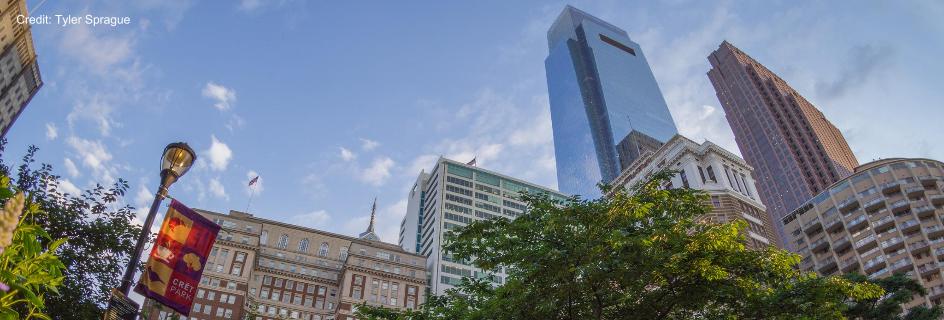- About GPA
- Global Events
- GLOBAL NEWS FROM PHL
- Global Directory
- World Heritage City
- Sustainable Development Goals (SDGs)
- Global Philadelphia Role on Sustainable Development Goals
- Completed Sustainable Development Goals
- SDG#1: No Poverty
- SDG #2: Zero Hunger
- SDG#3: Good Health & Well-Being
- SDG#4: Quality Education
- SDG#5: Gender Equality
- SDG#6: Clean Water & Sanitation
- SDG#7: Affordable and Clean Energy
- SDG #8: Decent Work and Economic Growth
- SDG #9: Industry, Innovation, and Infrastructure
- SDG#10: Reduced Inequalities
- SDG#11: Sustainable Cities and Communities
- SDG#16: Peace, Justice and Strong Institutions
- SDG#17: Partnerships for the Goals
- Press
Home ›
Groundbreaking Egyptian Musician Fathy Salama Visits The Penn Museum
Posted on April 28, 2014

Gabrielle Lantieri, for GPA -- Surrounded by the ancient history of Egypt at the Sphinx Gallery at the Penn Museum (3260 South St.), Grammy award-winning composer and pianist, Fathy Salama spoke last Wednesday about his experience as an Egyptian musician.
Inspired by Islamic tradition, he sought throughout his career to merge modern music with traditional Arabic music. He described his influences as a mix of everything, ranging from the Beatles, to jazz, to traditional Sufi music. He began composing pop music in Egypt during the '80s, but in 1989 decided to go off the scene, beginning his own group called Sharkiat. He felt strongly about creating different music and moving away from the mundane, repetitive pop industry that was dominated by top-grossing companies. Interestingly, this new venture was less accepted in Egypt and found more success in Europe.
Salama was ahead of his time. Since the Egyptian revolution in 2011, more musicians have diverged from tradition and begun expressing themselves through social media outlets. “With this change, young people have stopped caring about companies and started putting their own [music] online,” Salama said.
But not all the music coming out of the revolution is up to Salama’s standards. “Now everyone is a musician,” he said, complaining that there is more emphasis on the political message, rather than the quality of the music itself.
He sees this disparity as part of a larger, problematic shift towards American music and an abandonment of Arabic tradition. He cites a failing musical education system in Egypt as the reason for a lack of pride in traditional Arabic culture and heritage. To make matters worse, students who are classically and traditionally trained “don’t have much chance in the music scene,” according to Salama.
Many young musicians are not able to perform because youth culture is not interested in attending these kinds of performances and is more interested in the influence of American music. Nonetheless, Salama admirers the work being done by Egyptian hip-hop artists. “They are doing something new and different,” he explained, describing their work as placing hip-hop style lyrics on the complex rhythms of Arabic music.
Salama also provided the audience with an introduction to Arabic music theory. He discussed the similarities and differences between traditional Arabic music and the Western diatonic scale. Jazz music is similar to the Arabic tradition of improvisation and melodic modes known as “maqam.” Fusing Arabic music with traditional Western major and minor scale systems becomes more complicated, he demonstrated, given that the nomenclature in Arabic music is more detailed. Also, traditional Arabic music would be tuned to the voice of the singer, making it complicated to adapt harmony. Salama described Arabic music as “rich in melody, but lacking harmony found in Western music.” This micro-tonal aspect of Arabic music provides a special sound but creates complications when imposing melodies onto written pieces. Lyrics would have a different articulation than the written music, creating a complex rhythm as well. Despite this, Salama is most known musically for creating harmonies for these difficult melodies.
Salama is currently working with revolutionary musicians, teaching music workshops as well as opening an alternative music school that would be independently funded and not affiliated with the government. He is also involved with constructing a micro-tonal instrumental with Yamaha that would be a portable addition to a piano.
Fathy Salama remained in Philadelphia for a week, leading educational music workshops at schools in the area. Concluding his visit, he performed on April 27 at the Trinity Center for Urban Life, presented by Al-Bustan Seeds of Culture along with the Al-Bustan Takht Ensemble. This concert was a part of the Al-Bustan Spring 2014 Concert Series which features international artists in collaboration with the Takht Ensemble. Residency activities include a week of rehearsals, workshops and demonstrations, culminating with a concert performance in Philadelphia. Tickets are available at www.albustanseeds.org/music.
Photo courtesy of Penn Art and Culture.







